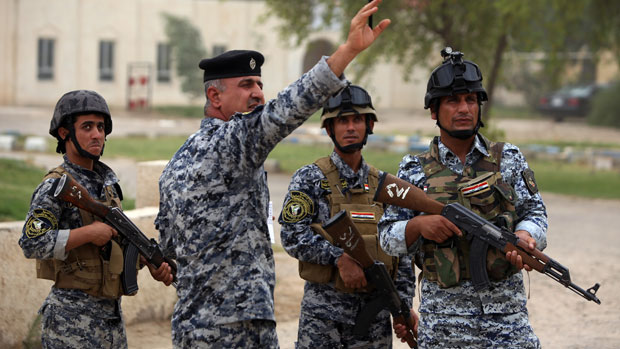If US helps fight Isis, it could mean targeting British citizens
Government under pressure to do something about British jihadists joining Islamist takeover campaign

A free daily email with the biggest news stories of the day – and the best features from TheWeek.com
You are now subscribed
Your newsletter sign-up was successful
The Home Secretary, Theresa May, has another tricky issue landing in her in-tray this weekend: it concerns the growing fears that British citizens are going to Iraq to join the jihadists of Isis (the Islamic State of Iraq and Syria) now threatening to take Baghdad.
Depending on how far President Obama is prepared to go in helping Iraq's Prime Minister Nouri al-Maliki, it could mean US forces targeting British citizens.
May is likely to face demands by MPs for action to stop British men joining the Isis movement – rather than waiting for them to return from the front, as has been the case with Syria.
The Week
Escape your echo chamber. Get the facts behind the news, plus analysis from multiple perspectives.

Sign up for The Week's Free Newsletters
From our morning news briefing to a weekly Good News Newsletter, get the best of The Week delivered directly to your inbox.
From our morning news briefing to a weekly Good News Newsletter, get the best of The Week delivered directly to your inbox.
She can't do much about the 500 or more British fighters MI6 believes are already fighting for Isis against the Assad regime in Syria and could now be crossing the border to fight in Iraq. But efforts could be stepped up to prevent further British recruits joining the Islamist campaign.
Meanwhile, the first person in the UK to be convicted of terrorist offences in connection with the Syria conflict is to be sentenced this morning at Kingston Crown Court. Mashudur Choudhury, 31, of Stubbington Avenue, Portsmouth, was found guilty last month of going to Syria with the intention of joining a terrorist training camp.
May has been distracted for the past week by a Whitehall turf war with Education Secretary Michael Gove over the growing influence of Islamic extremists in Birmingham schools and the backlog in processing new passports.
William Hague, the Foreign Secretary, is also under pressure to get on top of the threat of an Isis takeover in Baghdad. He has been busy co-starring with actress Angelina Jolie at a three-day London summit on sexual violence against women in war zones.
A free daily email with the biggest news stories of the day – and the best features from TheWeek.com
Perhaps mindful of the Daily Mail's dig at him – a photograph of Hague sandwiched between Angelina and her partner Brad Pitt carries the headline 'Starstruck: As Iraq implodes… Hague hobnobs with Brangelina' - the Foreign Secretary has tweeted this morning: “Talks with John Kerry [US Secretary of State] today in margins of closing session of summit to end sexual violence in conflict.”
Hague has made it clear that Britain will not be sending troops to the region after MPs voted last year against any military involvement against the Assad regime. But the UK is expected to give diplomatic support to the US at the United Nations.
President Obama has said he is “ruling nothing out” in backing the Iraqi government against Isis. Any US intervention is unlikely to mean boots on the ground, but it could include US drone attacks and possible air strikes against Isis – hence the threat of the US targeting British citizens.
Downing Street has confirmed that MI6 is investigating just how many British citizens might be fighting with Isis in Iraq. As the Daily Telegraph reports, the security service believes the prospect of radicalised and battle-hardened Britons returning from Syria and Iraq to commit terrorist attacks on British soil is the single biggest security threat to the UK.
David Cameron was among the G7 leaders who discussed last week how to “turn off the taps” of terrorist financing, Downing Street said.
Isis could have up to £256m in funding after raiding the Mosul Central Bank, making it the world’s wealthiest terrorist organisation.
There are also global economic consequences of Isis capturing the oil city of Mosul. Iraq is Opec's second biggest oil producer and the price of Brent crude has jumped to more than $110 a barrel.
As the Telegraph's international business editor Ambrose Evans-Pritchard writes: "Most Western economies are still too weak to pay for oil above $110 and if prices rise above $140 it could have catastrophic effects upon the global economy."